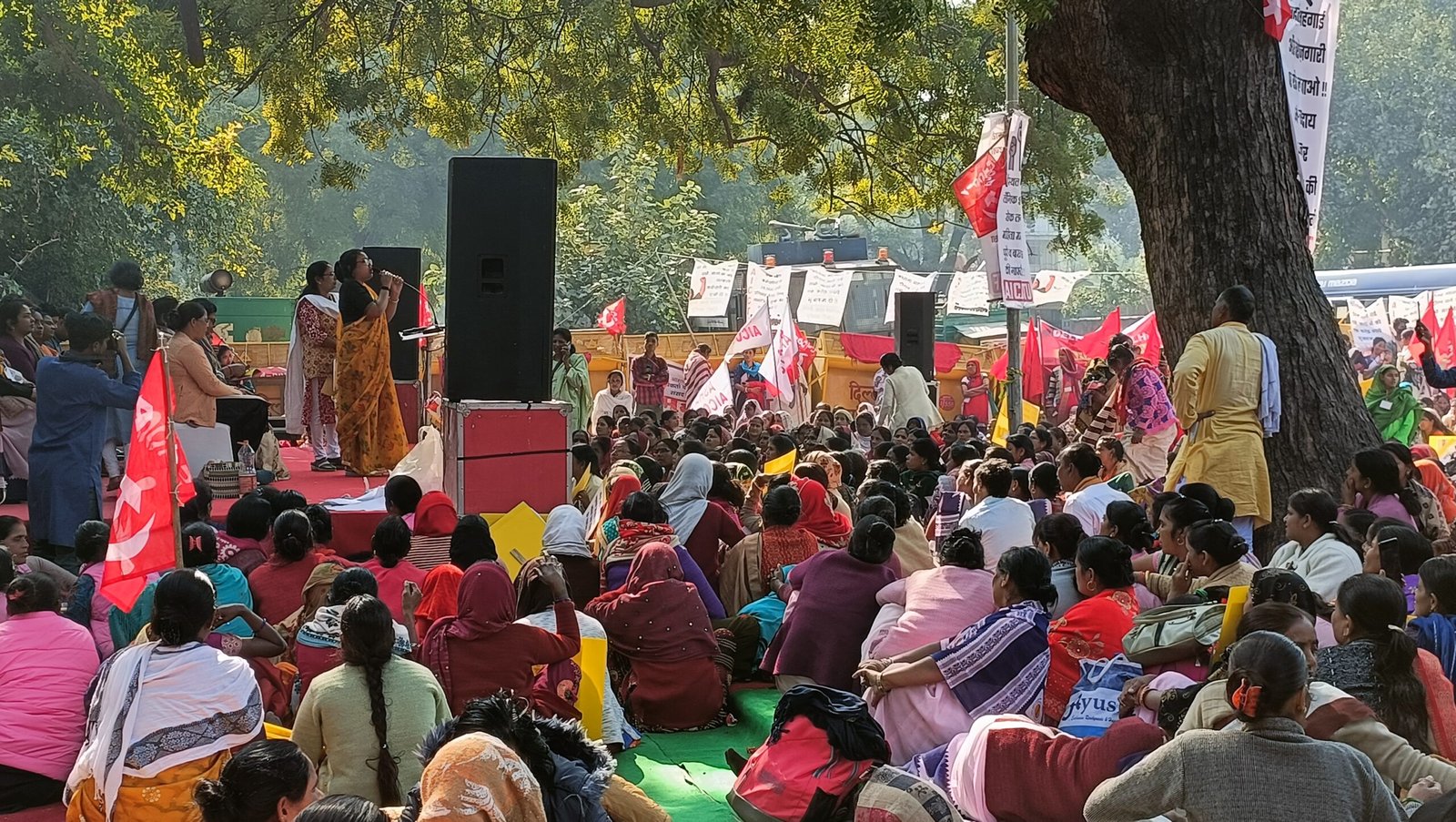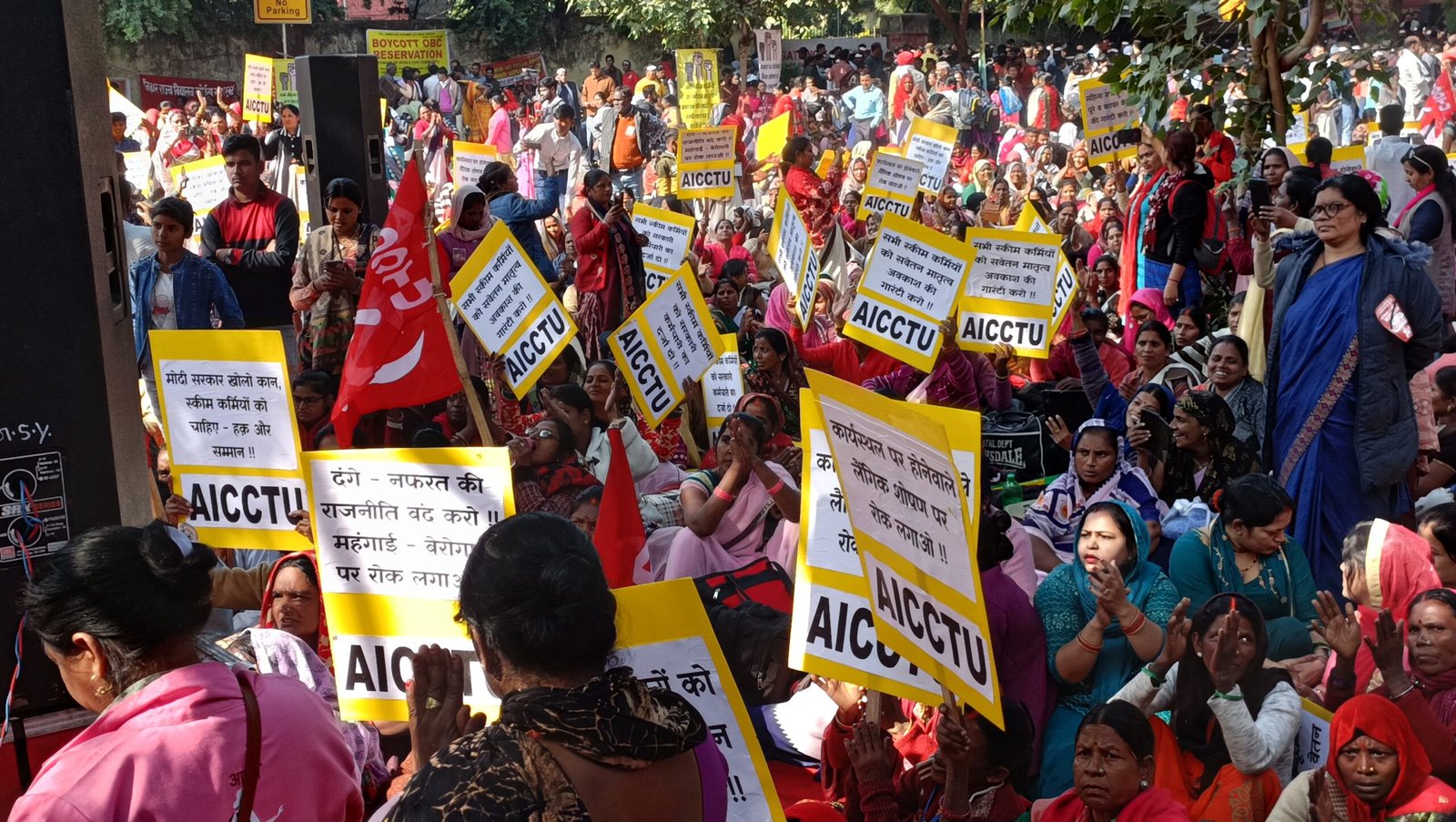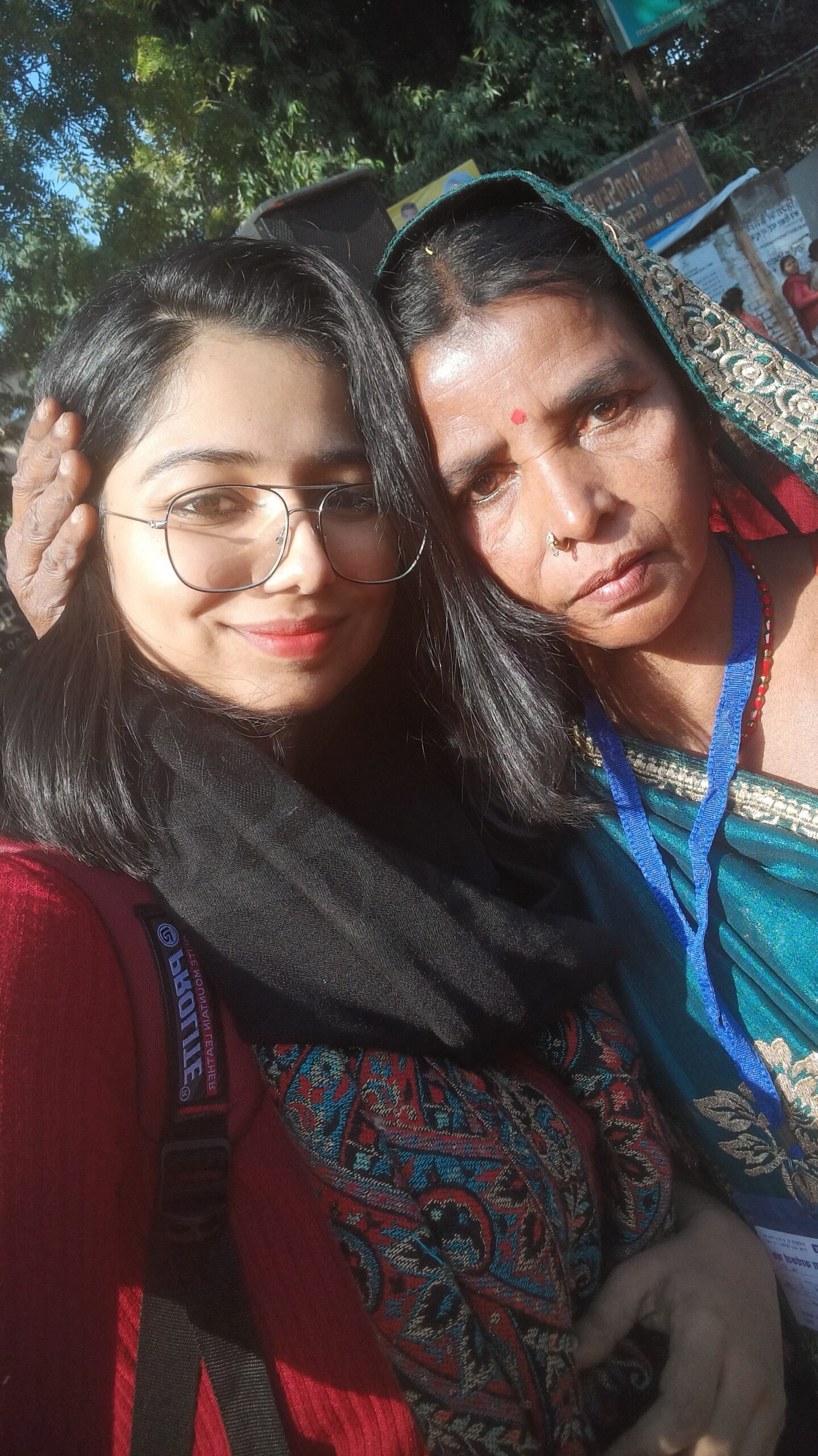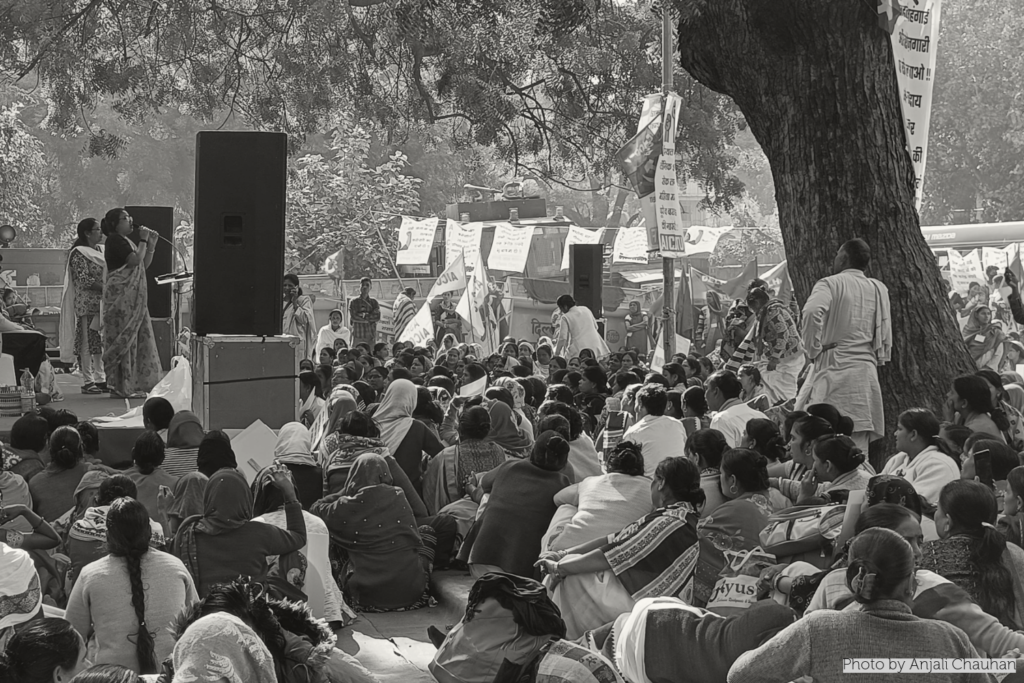For some, Women, Labour, and Resistance may seem like disconnected terms—each standing alone, with no meaningful overlap. Others might even find the notion of linking them together absurd. And those who hold that view may feel this call isn’t for them. This call speaks to those who see the threads that tie these words together. It’s for those who understand the hidden realities beneath the surface, beyond the obvious, and against the grain of convention. This call is for women who live those realities.
The first time I truly stood face to face with the powerful storm that these three words—Women, Labour, and Resistance—can unleash when brought together was in November 2022, at Jantar Mantar, New Delhi. It was during the All India Scheme Workers’ Protest—one of the earliest mass protests in post-pandemic India, and it was led by women.
There are moments in life that completely upend everything you thought you knew—moments that scoff at the carefully laid plans you’ve made for yourself, shake the comfort you’ve been resting in, and thrust you, without warning, into a new, unforeseen direction. They throw you so hard that you land face-first, breaking the rose-tinted glasses of privilege you’ve worn since birth. And it hurts—deeply, but for the better, I’d say.
For me, that protest was one such moment.

The world was slowly emerging from the havoc of the pandemic, and so was I. The pandemic not only forced me to confront but to live the harsh realities faced by so many women around me, those from my caste, who remain confined within the four walls of their homes, cemented by the so called savarna respectability, for most of their lives. I, however, managed to do some transgression. The longer the lockdown stretched on, the more desperate I became to escape. After all, “home,” as many call it, hasn’t been a safe space for most of us. And to leave, as always, I needed a so-called legitimate, respectable reason to abide by the imaginary of a respectable savarna woman.
Being born a Rajput woman meant I had to carry the crushing weight of izzat (honor), lihaz (respect), and sharam (chastity) with me in order to step outside the place I live. So, I decided to pursue higher education; a pursuit noble enough. Not that I wasn’t interested in it, but I would rather have tried my hands in either law or journalism. Everything happened in haste. I had to go through many fights, for months, with my father for it, given that an educated woman becomes a threat to their social order, but anyway, it happened. But when I reflect on that decision now, I realize that I probably should have taken a year off to give myself time to heal—mentally and physically—from everything I endured during the pandemic, including the terrible virus itself. I’m still struggling with some of those things. But rest and healing aren’t choices that most women can afford, are they? For me it was either taking an admission to go out or to rot at a place I didn’t feel belonged, or even safe. Of course I had to choose the former.
I had recently been admitted to the Ph.D. program at the Department of Political Science, University of Delhi. It was from that point onward that I began to push beyond the boundaries of my privileged comfort zone—privileges granted to me by my caste, class, and religion. Coming back to the protest —as I stood among over 4,000 women from all over India at Jantar Mantar, who have gathered there to resist against their gross exploitation and the terrible conditions they were forced to work under, their voices rising in unison, shouting Azadi (freedom) at the top of their lungs, I felt a kind of ease I had been searching for all my life. An ease that had always been elusive to me. It was my first time being part of a national-level protest, where women workers from all over India had gathered.

Yet, throughout the protest, I kept a sharp eye on the police standing behind the barricades, scanning their faces to see if my father was among them. He, too, serves in the Delhi Police. To be seen by him at a protest site would mean the abrupt end of my education, likely followed by a forced marriage and other horrors that I’d rather not spell out—for the sake of my own sanity. Even as I write this, I’m trusting in the absolute indifference of my community when it comes to education or anything related to it. I just hope they don’t find this essay, or any of my previous writing, for at least a few more years—until I have enough support, money, and strength to face them. And when I do, I hope I will be able to scream back and walk out on their damn faces!
It was at this protest that I met the woman who shook me back to my senses—Meena Didi. I still think of her whenever life feels unbearable, when I can’t see the point of anything I’m doing, or when the weight of it all makes me want to give up entirely. I remember seeing her struggle to get on the stage, so I reached out my hand to help. She took it, climbed up, adjusted her saree, and then smiled, her whole face lighting up, before hugging me. Leaning in close, she whispered in my ear, “I’ve never been on a stage before.” and I found myself smiling too. Maybe it was because of her, or maybe happiness really is contagious—who knows?
She stayed beside me after that, occasionally holding my hand, nodding in affirmation as the speeches and slogans echoed around us. I felt an overwhelming warmth. I felt belonged—something I rarely ever feel. Those who know me know that I tend to repel people. I run away from gatherings, avoid eye contact, hide away, and carry a dead face, always simmering with anger beneath. But after meeting Meena Didi, for the first time, I felt at ease among over 4,000 women. It was the most my introverted self had ever done. Later, we sat down and chatted over chai. Didi sang her favourite regional song for me and mentioned that her daughter looks just like me. Her relatives were pressuring her to marry her daughter off, but she was determined to educate her. Meena Didi, an ASHA worker from Muzaffarpur, firmly believed in education. She told me, with conviction, that all women should go to college, earn their own money, and only then think about marriage. It’s what she wants for her daughter, too.

I shared my own thoughts, telling her that, in my opinion, getting married isn’t necessary or important—and that men are more trouble than they’re worth. She burst out laughing but chose not to comment further on that. Curious, I asked her more about her work and her life, and when I mentioned that I would be writing about it in a report, the expression on her face was unforgettable. Her eyes lit up as she asked, “Bachua, mera naam bhi chapega?” (My dear, my name will be published?) The pure delight in her voice was something I’ll never forget. As we parted ways, she invited me to visit her, and I promised I would—I truly wish to. Just before we left, she pressed a ₹100 note into my hand, saying, “Humare yahan betiyon ko khaali haath vida nahi karte.” (In our culture, we don’t send daughters away empty-handed.) I was overwhelmed, and the memory still brings tears to my eyes. I told her I couldn’t accept such a large amount and asked her to give me a ₹10 note instead, but she simply hugged me.
And then we went back to our respective lives. Later that night, around 10 p.m., she called to check if I had reached home safely and gently reminded me again to visit her. It struck me that she was the one who had to return to Bihar alone, taking a local train to continue her struggle to support herself and her seven family members as an ASHA worker—grossly underpaid and overworked, all while managing household chores and raising her children. After the call, I felt a sense of unease. That ₹100 note now lies safely between the pages of my well-worn copy of The Second Sex by Simone de Beauvoir.
Hundreds of women like Meena Didi across India stepped up to save the Indian health system during its total breakdown as ASHA (Accredited Social Health Activist), Anganwadi, and other scheme workers. They suffered then and continue to suffer from what has become a distant memory for many of us. Remember how they were showered with flowers during the pandemic? Perhaps those petals were the only form of remuneration they received for risking their lives to support and treat COVID-19 patients without adequate protective gear. They went door to door testing for the virus and delivering medicines, working long hours, often at odd times, and were rarely, if ever, compensated fairly. As the country slowly began to recover from the devastation of COVID-19 and hospital situations approached normalcy, these same workers were conveniently sidelined and abandoned. Their conditions have only worsened since, as they are left with either no jobs or poorly paid positions amidst a rising cost of living.
We recognize that each of you has experienced your own “moments” of defiance and strength—instances where you’ve challenged the status quo or simply found the will to speak out in a world that often seeks to silence you or to take the road less travelled. We encourage you to share these stories with us. Let your words resonate, not just for yourself, but for the countless women who need to hear them. Your narratives can serve as a lifeline, reminding others that they are not alone in their struggles and triumphs.
This call centres on the feminist axiom, “the personal is political,” inviting personal essays and reflections on resisting oppression. Women’s struggles for fair wages, safe working conditions, and the recognition of unpaid and undervalued labour are foundational to workplace rights. Yet, their stories are often overlooked. We urge you to share these stories—of resistance, organizing, and solidarity. As Audre Lorde powerfully states, poetry is not a luxury for women. Similarly, writing isn’t a luxury either, it’s a necessity—an act of survival and defiance. Women’s writing tells of courage, resilience, and disruption, reflecting both personal and collective struggles. It speaks to the fight for labour justice—whether organizing garment workers, caregivers, or challenging oppressive systems at large.
Tell us how you conceptualize labour in the context of undervalued care, domestic, and emotional work. Share personal stories of burnout, exhaustion, and empowerment born from struggle. Reflect on how labour and resistance intersect, highlighting women’s roles in transforming the workplace and advocating for justice. We welcome narratives spanning various experiences: navigating sexist workplaces, confronting biases, or resisting oppressive policies. Let’s weave a narrative that celebrates women’s victories while acknowledging our collective struggles. Your voice matters, and your stories can inspire others to reclaim their power. This issue is a rebellion—just as you are. Share your truth with us, and let writing become a tool for healing, resistance, and solidarity.
Together we go, together we fight, together we love, and together we heal.
.
.
.
For further reading:
- https://frontline.thehindu.com/the-nation/pink-wave-scheme-workers-demand-a-stop-to-their-exploitation/article66270330.ece
- https://behanbox.com/2023/11/02/73-days-and-counting-asha-workers-continue-their-strike-for-more-pay-in-haryana/
- https://behanbox.com/2024/01/16/how-asha-workers-overwhelming-workload-impacts-indias-healthcare-system/
- https://idronline.org/tag/asha-workers/


